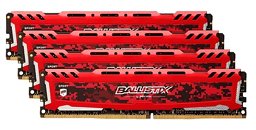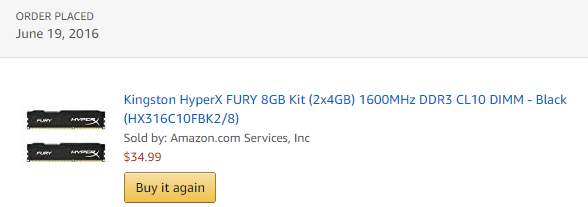- Joined
- Oct 9, 2007
- Messages
- 47,685 (7.42/day)
- Location
- Dublin, Ireland
| System Name | RBMK-1000 |
|---|---|
| Processor | AMD Ryzen 7 5700G |
| Motherboard | Gigabyte B550 AORUS Elite V2 |
| Cooling | DeepCool Gammax L240 V2 |
| Memory | 2x 16GB DDR4-3200 |
| Video Card(s) | Galax RTX 4070 Ti EX |
| Storage | Samsung 990 1TB |
| Display(s) | BenQ 1440p 60 Hz 27-inch |
| Case | Corsair Carbide 100R |
| Audio Device(s) | ASUS SupremeFX S1220A |
| Power Supply | Cooler Master MWE Gold 650W |
| Mouse | ASUS ROG Strix Impact |
| Keyboard | Gamdias Hermes E2 |
| Software | Windows 11 Pro |
Prices of PC DDR4 memory modules are normalizing to 3-year lows as the pre-Summer PC upgrade season looms and several AAA game launches line up. 8 GB (2x 4 GB) dual-channel DDR4 memory kits have dropped to around USD $50 on popular PC component retailers such as Newegg, 16 GB (2x 8 GB) kits can be had for $80 at DDR4-2667 speeds. Premium 16 GB dual-channel kits (DDR4-3200 and above) start at $99. Premium 16 GB kits with RGB embellishments now typically start at $120.
Perhaps the biggest news from these memory price drops come in the form of capacity. 32 GB dual-channel (2x 16 GB) memory kits now start for as little as $144, for a kit with two dual-rank DDR4-2667 modules. Premium 32 GB kits, with RGB lighting and speeds as high as DDR4-3000 now start at $180. HEDT builders also have reason to cheer, as 32 GB quad-channel (4x 8 GB) kits start for as little as $150, and premium kits with DDR4-3000 frequency can be had for as little as $184. Newegg and the US aren't the only places you can find sharp drops in memory prices. Even across the big pond in Germany, we've been tracking significant drops in memory prices, with 16 GB dual-channel kits starting at 79€, premium 16 GB kits around 100€, 32 GB kits at 160€, and premium 32 GB kits around 190€.

Memory prices showed an upward trend since the start of 2017 as the industry witnessed DRAM shortages. Some companies such as Samsung even put out brazen statements that it favors memory prices remaining high as it lets them be profitable and offset losses from their NAND flash portfolio. Market regulators around the world, including the Chinese, found massive evidence of price-fixing among DRAM makers, threatening them with heavy fines and market-access denial. The DRAM industry showed early signs of buckling to pressure from regulators as they revised their Q1-2019 outlook to expect fall in revenue from DRAM, signalling drop in DRAM prices.
View at TechPowerUp Main Site
Perhaps the biggest news from these memory price drops come in the form of capacity. 32 GB dual-channel (2x 16 GB) memory kits now start for as little as $144, for a kit with two dual-rank DDR4-2667 modules. Premium 32 GB kits, with RGB lighting and speeds as high as DDR4-3000 now start at $180. HEDT builders also have reason to cheer, as 32 GB quad-channel (4x 8 GB) kits start for as little as $150, and premium kits with DDR4-3000 frequency can be had for as little as $184. Newegg and the US aren't the only places you can find sharp drops in memory prices. Even across the big pond in Germany, we've been tracking significant drops in memory prices, with 16 GB dual-channel kits starting at 79€, premium 16 GB kits around 100€, 32 GB kits at 160€, and premium 32 GB kits around 190€.

Memory prices showed an upward trend since the start of 2017 as the industry witnessed DRAM shortages. Some companies such as Samsung even put out brazen statements that it favors memory prices remaining high as it lets them be profitable and offset losses from their NAND flash portfolio. Market regulators around the world, including the Chinese, found massive evidence of price-fixing among DRAM makers, threatening them with heavy fines and market-access denial. The DRAM industry showed early signs of buckling to pressure from regulators as they revised their Q1-2019 outlook to expect fall in revenue from DRAM, signalling drop in DRAM prices.
View at TechPowerUp Main Site










